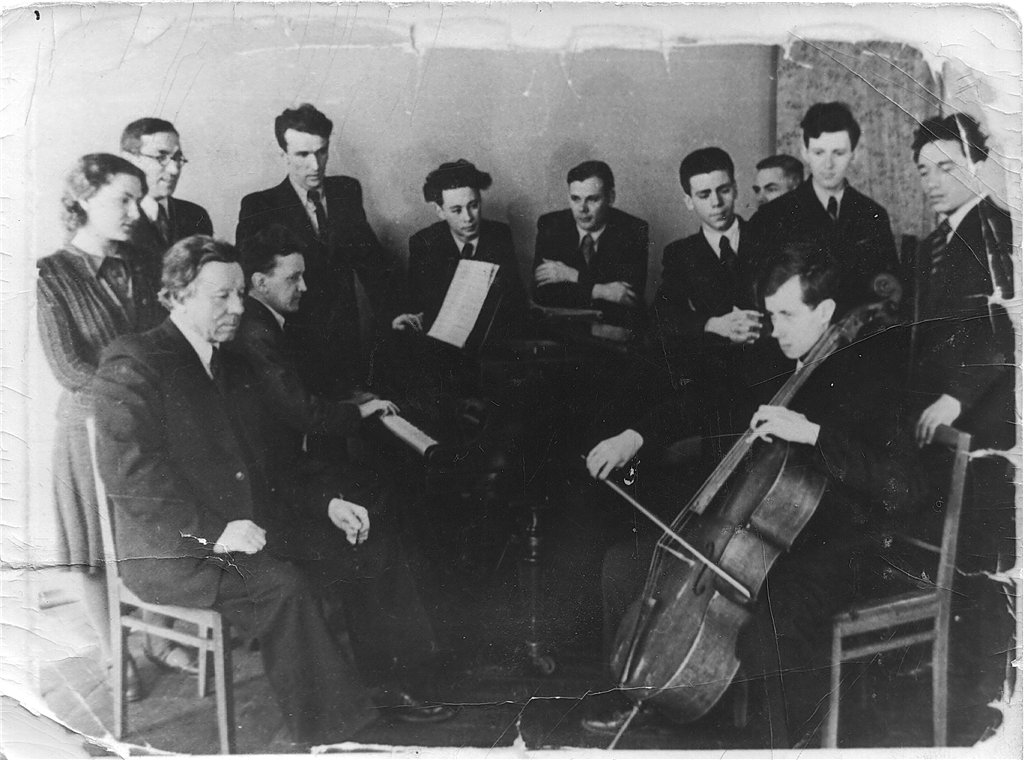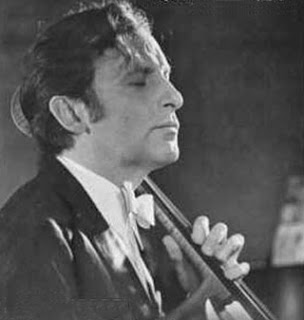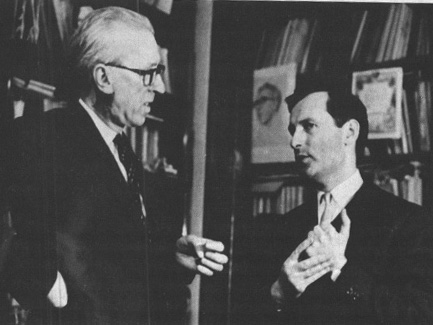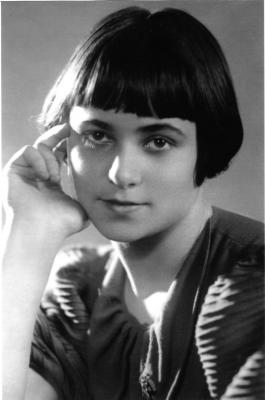Earwitness #75: ‘Everything in memory of you…’. Our series about 20th century Russian music is, for the second time, dedicated today to the Russian cello school. Halfway the previous century two amazing new talents appeared: Daniel Sjafran in Leningrad en Mstislav Rostropóvitsj in Moskou.
Gregor Pjatigorski can’t quite remember if he first met the “unpleasant and frank” Prokofjev at Sergej Koesevitski’s house in Boston, in Paris after a recital with Vladimir Horowitz or in Berlin, when he asked Prokofjev to compose a cello concert for him after they had performed ‘Ballada’ together, an early work of the composer. “I don’t know that crazy instruments of yours” Prokofjev answered. Pjatigorski says that he then played for him and demonstrated all the possibilities of the instrument while the composer jumped up now and then. “Yes, that is nice! Play that again!” Prokofjev exclaimed. He asked the cellist for some typical cello music, but after he had studied it he said: “You mustn’t keep this in your home, it stinks”. We open with the ‘Ballada’ opus 15, an early work by Sergej Prokofjev from 1912. You will hear cellist Boris Pergamensjtsjikov, a first-prize winner of the Tsjajkovski concours in 1974 and pianist Pavel Gililov.
Pjatigorski also talks about his correspondence with Prokofjev about the intended cello concert. It didn’t bother the composer that their contact was hampered by the abbreviation system for consonants that Prokofjev proudly applied. The first part came about slowly, after which Prokofjev and Pjatigorski went into conclave about the second part. That continued until Prokofjev expressed that he couldn’t to anything as long as he wasn’t in his home country. In 1936 he went back home for good. Pjatigorski: “When I received the manuscript of the cello concert he was back in Russia, what considerably hampered our contact. The many possibilities that occurred during the coming about weren’t simplified by Prokofjev’s mentioning: ‘Do everything you think is necessary. You have carte blanche’.”
The cello concert in e minor, opus 58 had its premiere in Boston, led by Sergej Koesevitski with Pjatigorski as soloist.
Listen to a performance by another European emigrant Janos Starker (on the right). This American-Jewish cellist of Polish-Ukrainian descent made the crossing to America in 1948 after ramblings from his birth town Budapest through post-war Europe. He became leader of the cellists at the Dallas Symphony Orchestra led by Antal Dorati, before he made the switch to the Metropolitan Opera in New York led by Fritz Reiner in 1949. The conductor and cellist left together to the Chicago Symphony Orchestra in 1952. The Philharmonic Orchestra is led by Walter Süsskind.
In Russia the work remained unrecognized after its failed premiere and became forgotten until a 20-year-old first prize winner played it in the presence of the composer in the Small Hall of the Conservatoire at the celebration of the 30th anniversary of the October Revolution on 21 December 1947. Gratefully, Prokofjev applied himself to compose a work that specifically met the technical possibilities and talents of this young musician Mstislav Rostropovitsj . Rostropóvitsj was born on 27 March 1927 in Bakoe, where he received his first music lessons from his mother, and father Leopold a student of Pablo Casals himself. The 16-year-old Mstislav went to study cello in Moscow at Semjon Kozolóepov, who made him a “master with a perfect control over the cello”, and composition at Dimitri.
Sjostakovitsj and Sergej Prokofjev. These two composers became his best friends and dedicated works to him, something that many composers after them would do in a tradition that would increase the cello literature by more than 100 works.
Prokofjevs changed his first plan to rewrite the first cello concert and replaced it by composing a brand new piece that he dedicated to Rostropovitsj, his first cello sonata in C from 1949, that he wrote along the lines of the second cello sonata by Nikolaj Mjaskovski that you will hear at the end of this broadcast. You will hear Rostropovitsj and pianist Aleksandr Dedoechin. 
The class of Kozoloepov, with the sitting teacher on the left, a playing Rostropovitsj on the right and standing fourth from the right Valentin Berlinski, who later would become cellist at the Borodin Quartet.
The other cello giant of halfway the 20th century was Daniel Sjafran who was born in 1923 in Petrograd as the son of a pianist and the solo cellist of the Leningrads Philharmonic. You may have heard Sjafran before in Ear Witness in the sonatas by Sergej Rachmaninov and Dmitri Sjostakovitsj together with the composer.
 Sjafran (on the left) became a student of Aleksandr Sjtrimer at the age of ten. In 1937, when he was fourteen years old he was granted a dispensation to compete in the Uniebrede Concours for strings and promptly won the first prize. After this he would cross bows for the first time with the four-year younger Rostropovitsj in 1949. They would win the Democratic Youth Festival in Budapest together. Jury member David Oistrach said at that occasion: “both cellists were master in the cello sound. Their light virtuosity and elegant technique may severe as an example and envy many violin players”. A year later the duo again shared the first prize in Prague. In that same year Sjafran broke off his relation with Leningrad to go study in Moscow. In 1950 he played the cello concert of Dmitri Kabalevski together with the conducting composer in such a way that Kabalevski immediately wrote a second concert for him. Today you will hear Kabalevski’s first cello concert from 1952, performed by Daniel Sjafran and the Great Symphony Orchestra led by the composer. (Below the composer (left) and the cellist together).
Sjafran (on the left) became a student of Aleksandr Sjtrimer at the age of ten. In 1937, when he was fourteen years old he was granted a dispensation to compete in the Uniebrede Concours for strings and promptly won the first prize. After this he would cross bows for the first time with the four-year younger Rostropovitsj in 1949. They would win the Democratic Youth Festival in Budapest together. Jury member David Oistrach said at that occasion: “both cellists were master in the cello sound. Their light virtuosity and elegant technique may severe as an example and envy many violin players”. A year later the duo again shared the first prize in Prague. In that same year Sjafran broke off his relation with Leningrad to go study in Moscow. In 1950 he played the cello concert of Dmitri Kabalevski together with the conducting composer in such a way that Kabalevski immediately wrote a second concert for him. Today you will hear Kabalevski’s first cello concert from 1952, performed by Daniel Sjafran and the Great Symphony Orchestra led by the composer. (Below the composer (left) and the cellist together). 
We will end the cello part of this episode in style with the second cello sonata by Nikolaj Mjaskovski from 1948-1949 that was dedicated to Mstislav Rostropovitsj. Listen to an exponent of the next generation, Rostropovitsj’s student Natalia Gutman. Vjatsjeslav Poproegin accompanied her. The next Ear Witness will be dedicated to the memory of Mjaskovski, who died on 8 August 1950. The parts are Allegro moderato, Andante cantabile and Allegro con Spirito.  The first international Chopin Concours in Warschau took place in 1949, with Bella Davidovitsj as the first-prize winner. The last post-war soviet triumphs date from 1937, when Jakov Zak won and the 17-year-old Rosa Tamárkina (on the right) came in second. She died on 5 August 1950 at the age of 30 in Moscow. Rosa Tamarkina plays from Sergej Rachmaninov the prelude in e-flat and the gavotte from 1889, the prelude in F from 1891 and the prelude in c opus 23 no 7 from 1903.
The first international Chopin Concours in Warschau took place in 1949, with Bella Davidovitsj as the first-prize winner. The last post-war soviet triumphs date from 1937, when Jakov Zak won and the 17-year-old Rosa Tamárkina (on the right) came in second. She died on 5 August 1950 at the age of 30 in Moscow. Rosa Tamarkina plays from Sergej Rachmaninov the prelude in e-flat and the gavotte from 1889, the prelude in F from 1891 and the prelude in c opus 23 no 7 from 1903.
Sergej Sergejevitsj Prokofjev (1891-1953).
1. Ballade in c minor opus 15 (1912).Boris Pergamensjtsjikov (Leningrad 29.8.1948 – Berlijn 30.4.2004), cello; Pavel Gililov, piano.
Orfeo C 249 921 A.
2. Concert for cello and orchestra in e minor opus 58 (1934-1938): 1) Andante – Poco meno mosso: andante assai – Adagio, 2) Allegro giusto, 3) Tema (allegro) – Interludio 1 – Variaties 1-3, Interludio II – Variatie 4 – Reminiscenza (meno messo) – Coda (poco sostenuto) – Più mosso. Janos Starker (Boedapast 5.7.1924 – Bloomington, Indiana 28.4.2013), cello; Philharmonia Orchestra led by Walter Süsskind. EMI EKC6D-1029.
3. Cello sonata no 1 in C opus 119 (1949): 1) Andante grave, 2) Moderato, 3) Allegro ma non troppo. Mstislav Leopóldovitsj Rostropovitsj (Bakoe, 27.3.1927 – 27.4.2007), cello; Aleksandr Dedoechin, piano. Brilliant Classics 92771/6.
4. Dmitri Borisovitsj Kabalevski (1904-1987). Celloconcert no 1 in g opus 49 (1948-1949): 1) Allegro, 2) Largo, 3) Allegretto (recording 27.4.1952). Daniel Borisovitsj Sjafran (13.1.1923 Petrograd – 7.2.1997, Moskou), cello; Great Symphonics Orchestra led by Dmitri Kabalevski. Brilliant Classics 93096/7.
5. Nikolaj Jakovlevitsj Mjaskovski (Lomtse 20.4.1881 – Sivtsev Vrazjek 8.8.1950). Sonata no 2 for cello and piano in a opus 81 (1948-1949): 1) Allegro moderato, 2) Andante cantabile en 2) Allegro con Spirito. Natalia Gutman (Kazan, 14.11.1942), cello en Vjatsjeslav Poproegin, piano. Natalia Gutman Portrait Series Vol. V/ Live Classics LCL 209. Sergej Vasiljevitsj Rachmaninov (Novgorod, 1.4.1873 – Beverly Hills, 28.3.1943).
6. Prelude in es (1889), 7. Prelude in F (1891), 8. Gavotte (1889), 9. Prélude in c opus 23 no 7 (1903). Rosa Tamarkina (Kiev, 23.3.1920 – Moskou, 5.8.1950), piano.
Vista Vera VVCD-00101.
Special thanks to Dmitri Ferschtman.








